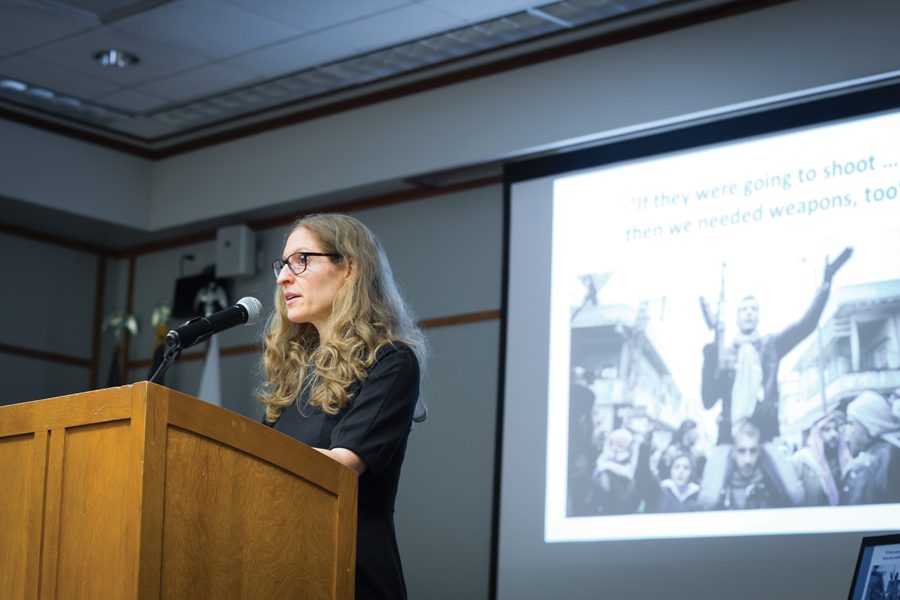NU Prof. Wendy Pearlman highlights Syrian voices in Time Magazine cover story
Daily file photo by Eddie Bednarek
Political science Prof. Wendy Pearlman speaks about her book at an October event. Pearlman recently published accounts of Syrians living through violence in Ghouta in the international cover story for Time magazine.
March 7, 2018
While political science Prof. Wendy Pearlman said there are many narratives in the media about Syrian people, she wants to create a space for them to be able to “speak for themselves.”
“Commentators from TV talk about who Syrians are, what they want, what their conflict is,” Pearlman said. “But Syrians also have a different point of view … so we should listen to their stories from the human point of view.”
Pearlman and co-author Loubna Mrie, a Syrian journalist who is seeking asylum in the United States, collected gripping firsthand accounts of Syrians living through bombings in the city of Ghouta. The resulting story was chosen for the cover of Time magazine’s March 12 international edition.
The story lays out how the Syrian government cracked down in 2012 on rebel forces rising up in the Damascus suburb during the Arab Spring. Shortly after the rebels took up arms and drove Bashar Assad’s regime out of the area, the regime forces began a siege that deprived Syrians of basic necessities like food and medicine.
In February 2018, the situation escalated as the Syrian military attempted to recapture Ghouta and ramped up “one of the most intense bombing attacks yet,” killing at least 500 civilians in the region, according to the story. As the violence in Ghouta reached extreme heights, Pearlman said she was contacted by Time’s international editor, Dan Stewart, to write a story using the style of “oral reportage” through firsthand testimonies from sources in Syria.
Mrie, who is now a New York University master’s student, said even though the process of reaching out to civilians in Ghouta on Facebook and WhatsApp was “exhausting,” she feels proud of the final project presented to the public.
Mrie added that she was happy that Time magazine was interested in covering the recent violence sweeping Ghouta, given that the Syrian civil war has entered its seventh year.
“For the normal American audience, you feel that (people think) ‘This is the normal status of the Middle East, so why the f–k should we care?’” Mrie said.
The final product was “a real team effort,” as she and Mrie worked to pull together different aspects of the story, Pearlman said. For example, when she realized there was only one Syrian woman featured in the first version of the story, she asked Mrie to diversify the sources to ensure greater gender balance in the narrative, she said.
Pearlman is also the author of “We Crossed a Bridge and It Trembled: Voices from Syria,” a book of intimate testimonies from Syrians whose lives have been transformed by war and revolution.
English Prof. Brian Edwards, director of the Middle East and North African Studies program, highlighted Pearlman’s interdisciplinary approach in her scholarship, which he said combines methodology in political science, ethnography and literary studies.
“What’s great about an article like hers in Time Magazine is that she has great respect as a scholar and a researcher,” Edwards said. “The importance of her research and writing to the international community is obvious. … We were proud and excited to see her further reach in the research.”
Email: [email protected]
Twitter: @piuadrianw












